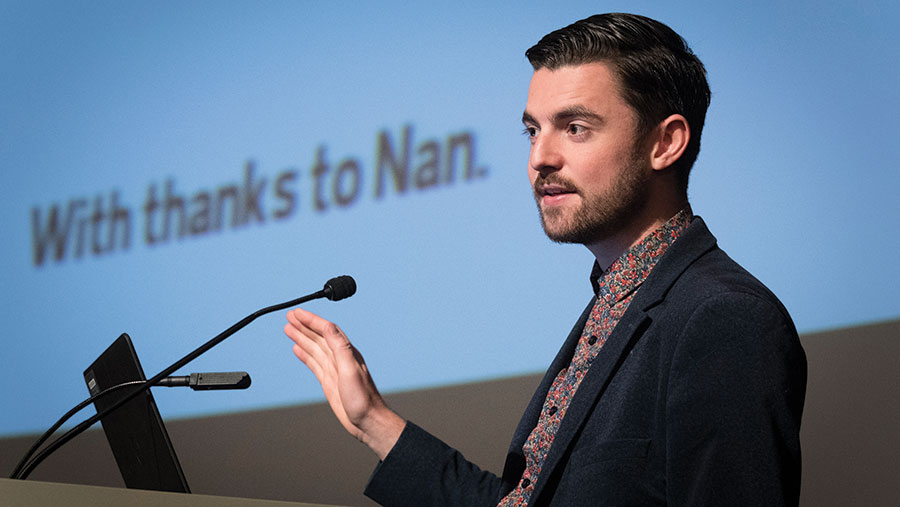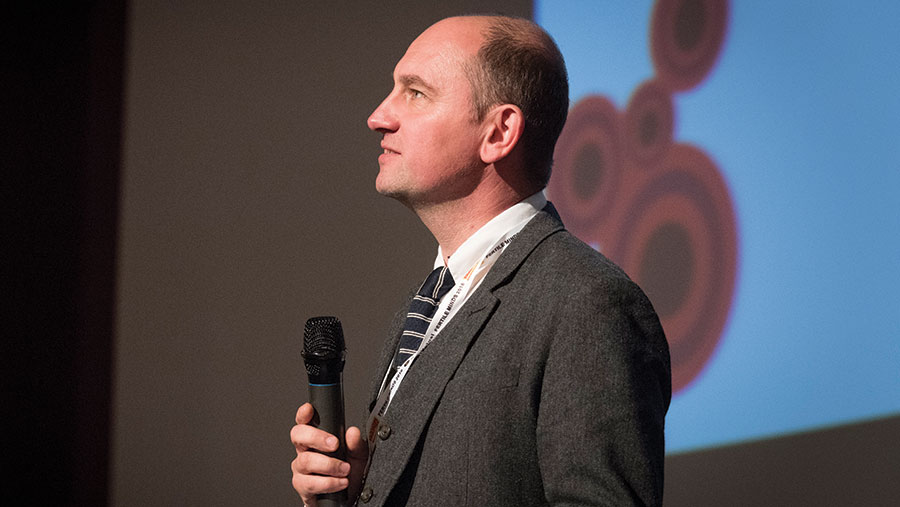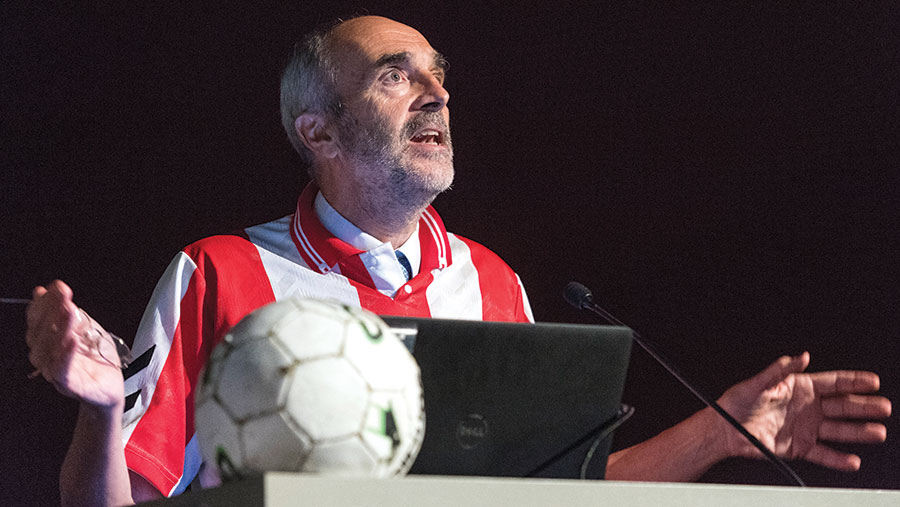Fertile Minds 2016: Insights and innovation
 Delegates at the Fertile Minds 2016 conference © Jim Varney
Delegates at the Fertile Minds 2016 conference © Jim Varney Great insights and inspiration abounded when young farmers gathered in Cumbria for the Fertile Minds conference, run by Farmers Weekly in association with NFU Mutual.
The delegates heard from a range of speakers who gave advice on how to start up and succeed in business.
Retail contract
27-year-old Fraser Doherty, founder of the multimillion-pound SuperJam empire told the Fertile Minds conference about his experience of starting out in buisness.
He started selling his jam door-to-door at 14, before deciding to try to get it into supermarkets, despite lacking money and experience.
See also: Five-point guide to a successful farm business plan
After trial and error he hit on the right recipe for his jam and his business and Waitrose agreed to stock his SuperJam, which is now sold across the world.

Fraser Doherty speaking at Fertile Minds © Jim Varney
Mr Doherty shared his top business tips with delegates:
- You don’t have to be revolutionary. “A great idea definitely doesn’t have to reinvent the wheel. It is possible to do something extraordinary with something ordinary.”
- Don’t be afraid. “A lot of the time when people have an idea for a business they are terrified. How can I start a business? I don’t have access to enough money or I’ll have to borrow money. What I found is it is possible to start something on a very small scale. Don’t feel you have to jump in at the deep end and borrow a large amount of money.”
- Listen to customers. “The only person who is going to give you honest feedback is the customer.”
- Seek advice. “Something I have been amazed by on my whole journey is how happy and how willing other people have been to share what they have learned with me.”
Persistence and collaboration pay off
Farmers Weekly columnist Matthew Naylor, who started his career at 15 and now runs Naylor Flowers, shared the lessons he has learned during his career.

Matthew Naylor gives his business advice © Jim Varney
- Don’t get by on subsidies. “You’re good enough to cope without that. Try to stand on your own two feet and don’t expect special favours or treatment because, eventually, special favours and treatment come to an end.”
- Think ahead. “Try to focus on what you think society is going to be like in 20 years’ time and try to supply that market now. It will give you a head start over the big businesses that supply today’s and yesterday’s market.”
- Collaborate with others. “It’s nice to be independent and do your own thing, but it is very expensive,” said Naylor. “Try to see everybody as a potential partner. Collaborate with your competitors where you can. A lot of the wins in my career have been in the close collaborations with other people where you are both getting an advantage.”
- Being a farmer isn’t a business. “No one pays you to look like a farmer. It’s great to have an identity and be proud of it, but the core of being successful in business financially is to make sure you are producing a specific product or service that you are selling for more money than it is costing you to produce.”
- Stick at it. “There are always going to be days when things don’t go to according to plan. Times do get very bleak and that’s when you mustn’t give up – that’s when you must keep going because that is when you are learning.”
The dangers of silence about succession
Delegates also heard about the pitfalls of not planning for succession from speaker Matthew Lobley of Exeter University.
Joe worked on his dad’s farm for years for little money. But when Matthew asked him about the plan for him taking over the farm, Joe didn’t know. He had never talk about that, he said.
His father ended up splitting the farm equally between his seven children, despite only Joe having ever worked on it. Unable to buy out his siblings, Joe faced financial problems and ended up in social housing.
Joe’s story shows why talking about succession is vital, despite being awkward, Mr Lobley told attendees.
Why football is just like farming
Dressed in a football shirt and with a soccer ball in tow, farming business consultant Robin Hobson revealed that agriculture and the beautiful game are very alike.

Robin Hobson tells delegates why football is like farming © Jim Varney
Both are vocations and diversification is as important to farming as it is to football clubs with their shirt sales.
“No football club could survive today if playing football was all it did,” he said. “Farming is exactly the same. In many farms you need to use all your resources to allow you to carry on farming.”
Also both are about goals. Young farmers need to think about their goals and money doesn’t count.
“Money is secondary, if you don’t have enough you are unhappy, but it is not something that drives you or gives you value.”
Mr Hobson also told young farmers that “massive opportunities” are out there. “The biggest problem is deciding which ones are for you. Decide what your abilities are, look at the assets you’ve got, the facilities, the qualities of the farm and – most importantly – you.”
Finally, be a creator, not a criticiser. “Ninety percent of people are criticisers, 10% are creators. If you criticise, you are never wrong; if you try something, you can be wrong. I can guarantee none of you learned to ride a bike without falling off. There’s nothing wrong with that. That is how you learn.”
Fertile Minds goes on the road

Following the Fertile Minds conference, five regional Fertile Minds roadshows are now planned over the coming months, giving delegates another opportunity to network and develop their ideas.
“We were delighted to sponsor and attend Fertile Minds this year, and are very much looking forward to the regional roundtable discussions,” said a NFU Mutual spokesman.
“These events offer young farmers who are looking to take their agricultural careers to the next level an opportunity to listen to experts, participate in discussions, network with their peers and hone their ideas to future-proof their farming careers. At NFU Mutual we are proud to support the next generation of farmers.”
More details can be found by logging on the Fertile Minds event page.
